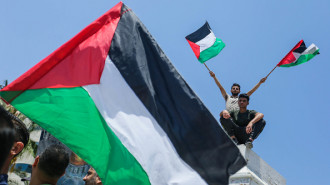Iraq slams 'political' evacuation of Exxon staff amid Gulf tensions
"The temporary withdrawal of employees has nothing to do with security in southern Iraqi oil fields or any threats," Oil Minister Thamer al-Ghadban said.
"The reasons are political and probably linked to tensions in the region," he added in a statement released by the oil ministry.
Ghadban called the move to pull out staff from the West Qorna oil field west of the southern port city of Basra "unacceptable and unjustified".
Exxon did not confirm the withdrawal.
"We are closely monitoring. As a matter of practice, we don't share specifics related to operational staffing at our facilities," a spokeswoman said.
"ExxonMobil has programmes and measures in place to provide security to protect its people, operations and facilities. We are committed to ensuring the safety of our employees and contractors at all of our facilities around the world," she added.
On Wednesday the United States ordered the evacuation of non-emergency staff from its Baghdad embassy and Erbil consulate, citing an "imminent" threat from Iranian-linked armed groups in Iraq.
It came 10 days after the Pentagon deployed an aircraft carrier task force and B-52 bombers to the Gulf to fend off an unspecified alleged plot by Tehran to attack US forces or allies.
Both the US and Iran are key allies of Iraq, and Baghdad has been under pressure from Washington to limit ties with its neighbour.
Rising tensions
The rising tensions came after US President Donald Trump unilaterally withdrew from the 2015 Iran nuclear deal in May last year. His administration has since reimposed punishing sanctions on the Islamic Republic.
But the dispute between Washington and Tehran has recently ratcheted up further as the US has increased its military presence in the region over alleged "Iranian threats."
On Saturday, Asharq Al-Awsat reported a Washington request to redeploy US forces in the Gulf was approved by Saudi Arabia and a number of GCC states, according to informed Gulf sources.
The redeployment of forces was approved based on “bilateral agreement” to protect energy supply and “prevent Iran from disrupting maritime traffic in that region,” the report said, quoting the sources.
Last week, President Donald Trump rejected a report that he is considering sending 120,000 troops to counter Iran, but didn't rule out deploying "a hell of a lot more" soldiers in the future.
According to the Times report, the 120,0000 troops under consideration would not be used to invade Iran, something that planners say would require much bigger numbers.
But such a huge deployment would reverse Trump's push throughout his presidency to reduce the US military presence abroad and to wind down what he says have been failed wars in the region.
Despite that stance, his government has taken an increasingly hard line with Iran, a longtime foe of the United States and key US allies Israel and Saudi Arabia.
Iran had not made any direct public threats to spark the US deployment, but Washington says it acted on intelligence reports of Iranian actions.
Follow us on Twitter: @The_NewArab







 Follow the Middle East's top stories in English at The New Arab on Google News
Follow the Middle East's top stories in English at The New Arab on Google News
![Aid Gaza [Getty]](/sites/default/files/styles/image_330x185/public/2010004231.jpeg?h=cb957c44&itok=NpHeiZFt)

